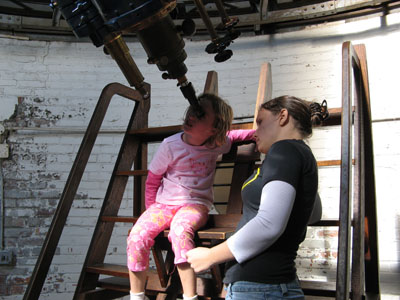In the field of astronomy we have an opportunity to make science popular again. Too many people give up on science for fear that it is too hard or there is too much math, but math & physics are more accessible than people suspect. Being able to derive everything I need to know from a few basic principles certainly makes a whole lot more sense to me than trying to figure out what James Joyce is trying to convey in Finnegans Wake. (For more eloquent words on this topic than mine, check out Natalie Angier's The Canon.) Despite their grand scale beyond our everyday world, many astronomy basics are easily observed (eclipses, moon phases, constellations, meteor showers, the seasons). Hopefully using these common yet awesome events combined with our pursuit of the unknown through exciting rocket adventures, NASA's searches for new Earths, and stunning pictures from the Hubble Space Telescope, we can lure some of those science-phobes back.
Details on a few of my efforts are below.
